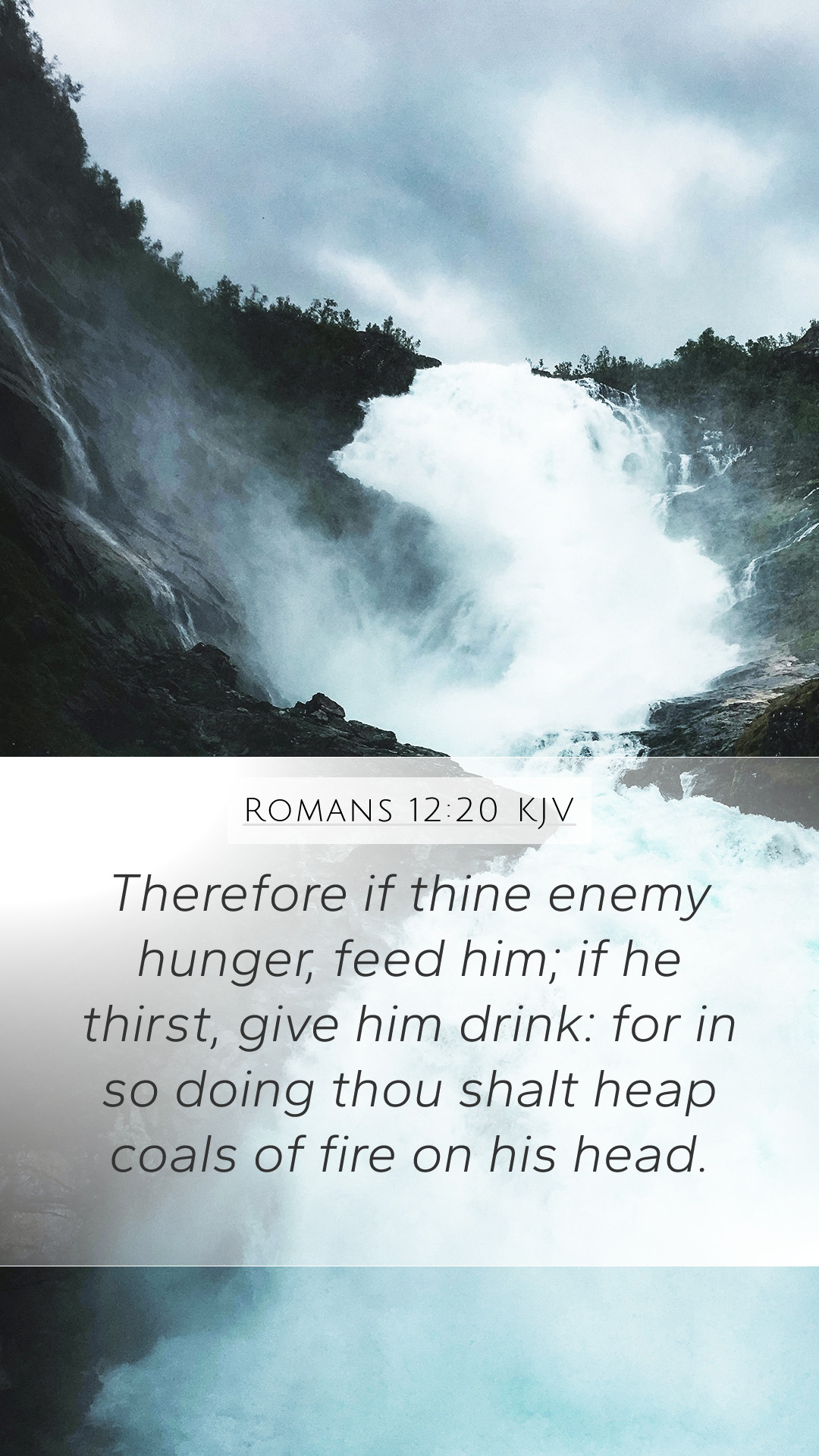Old Testament
Genesis Exodus Leviticus Numbers Deuteronomy Joshua Judges Ruth 1 Samuel 2 Samuel 1 Kings 2 Kings 1 Chronicles 2 Chronicles Ezra Nehemiah Esther Job Psalms Proverbs Ecclesiastes Song of Solomon Isaiah Jeremiah Lamentations Ezekiel Daniel Hosea Joel Amos Obadiah Jonah Micah Nahum Habakkuk Zephaniah Haggai Zechariah MalachiRomans 12:20 Meaning
What is the meaning of Romans 12:20?
Therefore if thine enemy hunger, feed him; if he thirst, give him drink: for in so doing thou shalt heap coals of fire on his head.
Romans 12:20 Bible Verse Meaning
Understanding Romans 12:20
"Therefore if your enemy is hungry, feed him; if he is thirsty, give him a drink; for in so doing you will heap coals of fire on his head." - Romans 12:20 (NKJV)
Bible Verse Meanings and Interpretations
Romans 12:20 presents a profound teaching on how one should respond to their enemies. This verse encapsulates the essence of Christian love, urging believers to act with kindness even towards those who may wish them harm. The insights from various public domain commentaries help elucidate the depth of this message.
-
Matthew Henry's Commentary:
Henry emphasizes that the act of feeding and providing for one's enemy runs counter to human nature and societal norms. He highlights that this behavior reflects a spirit of charity and the transformative power of love, which can lead to the potential repentance of the wrongdoer.
-
Albert Barnes' Notes:
Barnes interprets the phrase "heap coals of fire" as a metaphor for causing shame. He explains that by treating enemies with kindness, believers can provoke feelings of guilt and remorse, thus fostering an opportunity for reconciliation and positive change in relationships.
-
Adam Clarke's Commentary:
Clarke discusses the cultural significance of the phrase and its roots in ancient customs. He notes that the act of giving coals was a sign of goodwill and care, presenting a stark contrast to hostility and anger. This commentary underscores the moral imperative of acting benevolently towards adversaries.
Scripture Analysis and Biblical Exegesis
This verse serves as a key element in the broader context of Romans 12, where the apostle Paul instructs Christians on living a life that embodies the values of the Kingdom of God. He calls believers to rise above vengeance and hatred, as he presents a radical approach to inter-personal relationships.
In understanding this verse, one should consider:
- **The Historical Context**: Paul's audience faced persecution, and this teaching provided practical wisdom on how to navigate their societal challenges.
- **Theological Significance**: It aligns with the principle of turning the other cheek, emphasizing non-retaliation and the constructive power of love.
- **Practical Application**: This verse encourages Christians to respond to hostility with compassion, fostering an environment conducive to forgiveness and healing.
Applying Bible Verses to Daily Life
Readers of Romans 12:20 are challenged to incorporate its teachings into their lives. This principle can transform relationships, cultivate peace, and ultimately reflect the character of Christ. Some ways to apply this scripture include:
- Practice Kindness: Actively look for ways to show kindness to those who oppose you.
- Seek Reconciliation: Approach those with whom you have conflict and seek to mend relationships through love and understanding.
- Reflection and Prayer: Reflect on your personal reactions to adversity and pray for the strength to respond with grace.
Related Bible Cross References
- Matthew 5:44 - Jesus teaches to love your enemies and pray for those who persecute you.
- Proverbs 25:21-22 - Kindness to enemies can bring about positive transformation.
- 1 Peter 3:9 - Encourage believers not to retaliate but to bless others.
Bible Study Insights
For those involved in Bible study groups or online Bible study, Romans 12:20 serves as a powerful discussion point.
Consider utilizing the following Bible study tools and guides:
- Discussion Questions: Explore questions like "What does it mean to love your enemies?"
- Historical Contextualization: Provide background on the societal norms of the Roman Empire during Paul's time.
- Reflection Activities: Encourage participants to think of personal experiences where they can apply this teaching.
Conclusion
Romans 12:20 is a compelling reminder of the high call of love that Christians are to embrace. Understanding the meanings of Bible verses like this enriches one’s faith, cultivates a spirit of grace, and helps in responding to challenges with the love of Christ.


